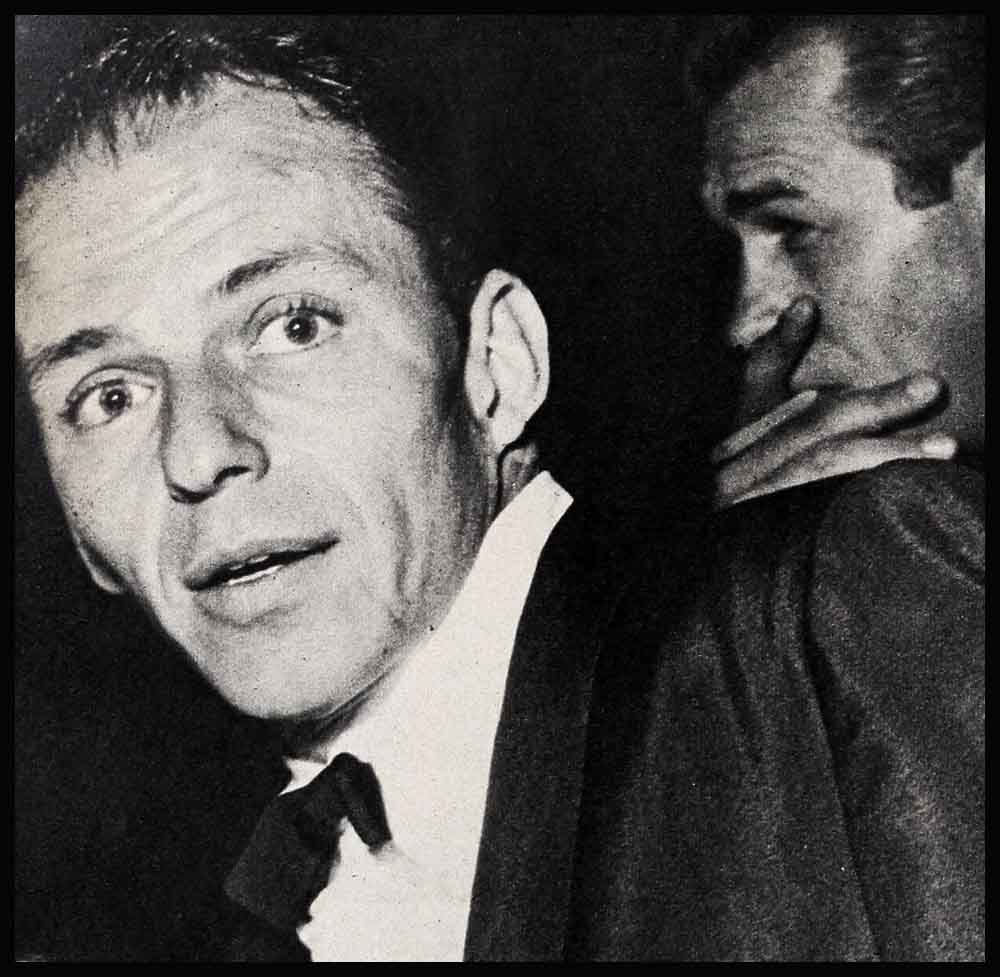
Stranger To Happiness—Frank Sinatra
This may sound silly . . . but I often think of my friend Frank Sinatra as a Russian . . . named “Frankie Sinatra-vitch.”
Now don’t get mad, Sinatra fans! I’m his friend, remember? I’m paying him a compliment.
In a way he’s like the Russians of history (not the Commies, but the Russians of the time of the Czars). He enjoys being unhappy. If he’s having a good time . . . well, he’s having a bad time.
Ava Gardner just happens to be the person he gets unhappy over when he finds he’s too happy to keep being happy. Or is that double talk?
You’ve seen Russians burlesqued by comedians. Tears pour down their contorted faces. They’re about to fall on their swords.
“I am so happy,” they gurgle, “I keel myself!”
But Russians aren’t the only ones. George Bernard Shaw said in one of his self-sketches, “Happiness is never my aim. Like Einstein, I am not happy and do not want to be happy.”
Am I out of my mind, mentioning Sinatra in the same paragraph with Shaw and Einstein? I think not. All three, all geniuses in their own fields, have felt that when you’re happy, you’re no longer ambitious . . . you’re in a rut.
Ava Gardner, and Nancy Sinatra before her, were living with a moody soul who became unhappy when he was too happy because he realized he wasn’t going anywhere from where he was. He would almost deliberately spill the applecart! Then he would go through a dramatic torture. As the Russians would say, “How I love to soffer,” Frankie would also be happy for a while, “soffering.”
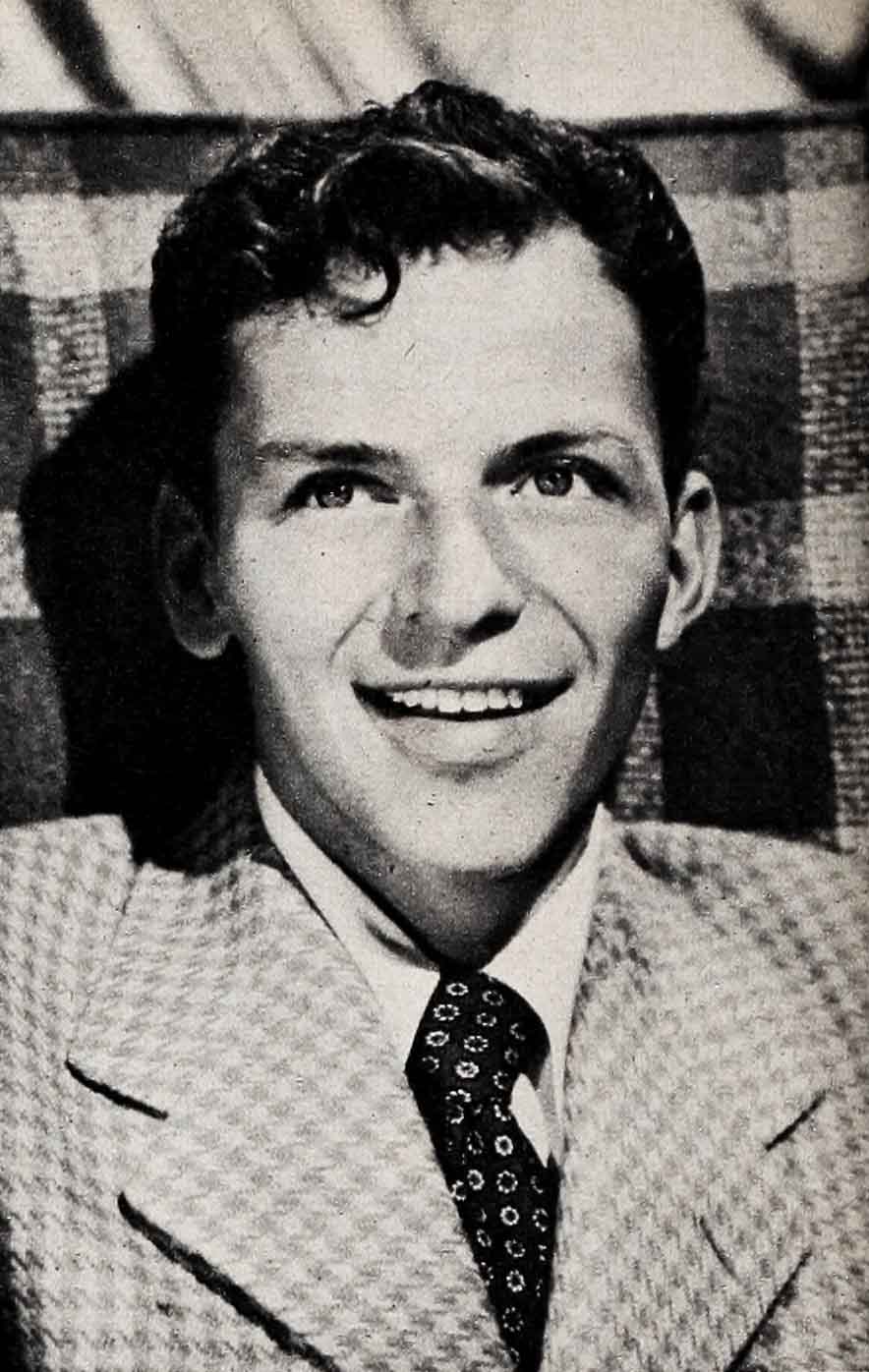
Thinking back to Nancy, Lana Turner and Marilyn Maxwell—all of whom played a part in Frank’s romantic life prior to Ava Gardner—I can see that Frank may be dramatizing his life.
Surely he’s entitled to think of himself as a dramatic figure in our history. Why not? When his latest tiff with Ava pushes Eisenhower or Churchill into secondary headlines? And do Ike or Winnie have fan clubs? And all the time people are saying he is getting better and better.
Anybody would be tempted. But if Frank feels this, he hasn’t openly shown it. He has remained, for the most part, “humble.”
For the dozen years I’ve known him, I’ve often heard him described, by others, as a “Jekyll and Hyde” . . . as a “combination angel and devil.”
Well, I’ve never seen the devil in him. And the last time I saw him, in the Beverly Hills Hotel in California, he was almost as meek as the first time.
That first time . . . well, one of my most precious keepsakes is a money clip which is inscribed: “Oil, youse is a poil.” It’s signed, “Frankie.”
It goes back to the fall of 1941. I was writing a piece on Tommy Dorsey. Tommy’s “band-boy” picked me up at the Hotel Astor in Tommy’s station wagon, and off we went to Meadowbrook. While waiting to talk to “T.D.” we had plenty of time to talk to the skinny young vocalist. The kids were already swooning over him, although the word swooning hadn’t yet been popularized.

Leaning across a table there at Meadowbrook, the youth with the toothpick figure earnestly told my wife and me of his ambitions. For one thing, he was writing a book: on counterpoint.
“That boy’ll be another Bing Crosby,” my wife prophesied.
I forgot about him for two years. One day a fellow on my staff said to me: “There’s a kid singing at the Paramount with Tommy Dorsey who’s got all the dames fainting and swooning. They’re saying he’s another Bing Crosby . . .”
I wrote about him almost every day when he opened at the Riobamba Cafe and got to know him well . . . hence, the money clip.
Then it started: the romance department.
Frankie and Nancy had not actually had an idyllic marriage. Bustups had been near. Now Frankie suddenly found half the prettiest dames in New York goofy over him. Suppose you’re a young squirt in your early twenties and Marlene Dietrich takes a fondness for you. And the biggest magazines in the business do stories on you. And columnists say you have more sex appeal in your voice than Rudy Vallee ever had . . .
The first fairly loud whispers were about Marilyn Maxwell . . . and the tragedy of that friendship. They wanted to break it off. But they couldn’t. It went on, and on, painfully and yet blissfully for each.
“Frank went through agonies,” recalls a friend. “He tortured himself, accusing himself of all sorts of things.”
In such affairs, the partisans often get desperate and depressed. Sometimes they think of self-destruction as the only way out. Frank and Marilyn were not that far along in their desperation, but they were in a practically hopeless entanglement for many months. And suddenly it was over . . .
Frankie has the greatest resilience of any star of our time—and anybody who keeps bouncing back as he has, can do it on only one thing: talent. His closest friends have underestimated that talent. Some of them thought of him as only a lucky singer.
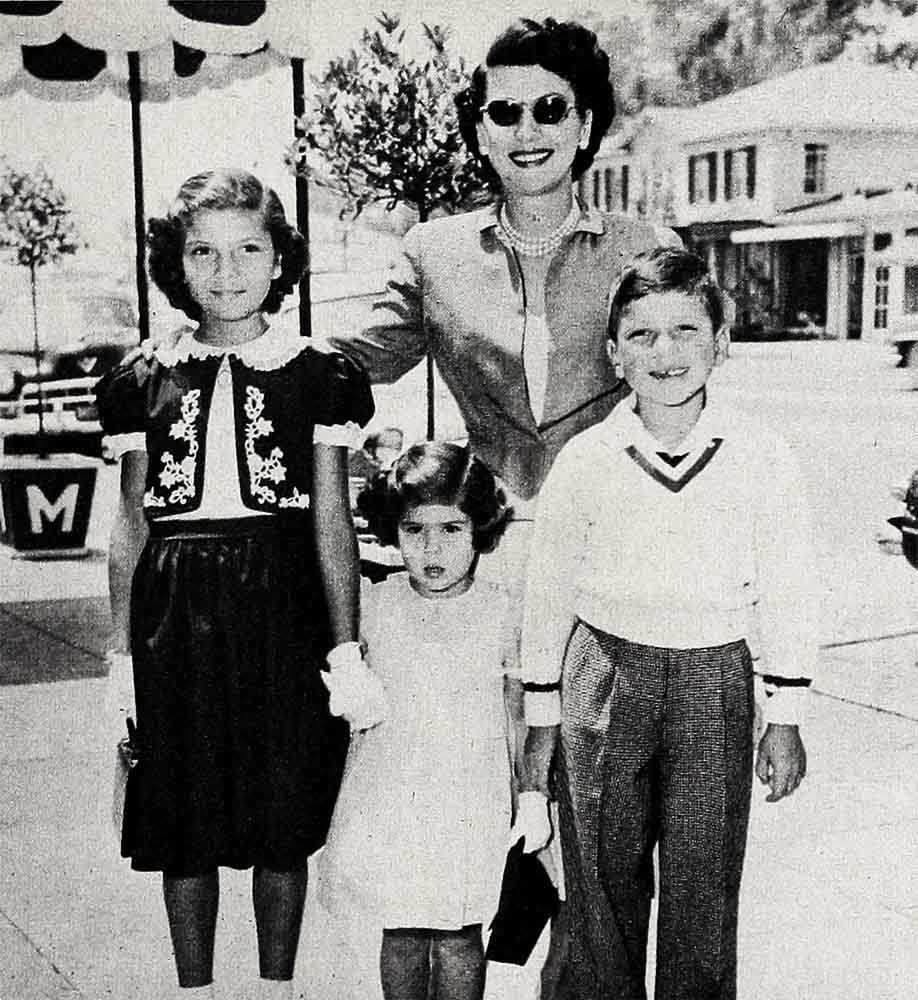
“The guy’ll be absolutely washed up in two years,” one of his intimates told me seven or eight years ago. “His pictures do nothin’ at the boxoffice,” this person went on. “He’ll be forgotten.”
Today we find him singing his best and packing every cafe he can be induced to work in. He is acclaimed now as an actor, thanks to his fine performance in “From Here to Eternity.” On television, he has given a succession of excellent portrayals—and now when Frankie makes a suggestion about acting, at a rehearsal, the other stars listen with great respect.
It’s something of a thrill to me . . . who has dogged his steps all these years . . . to see him reach that peak.
And yet, when he’s doing well, we all know that trouble of some kind is ahead, because Frankie can’t stand to be happy.
Lana Turner first became a chapter in his life story in the late 1940’s. He was starring on the stage at the Capitol Theatre on Broadway when the friendship became noticeable. Luscious Lana was in New York vacationing. A combination of Lana, and of the flu, forced Frank to miss several performances. Again the knockers went to work on him.
Lana’s bosses urged her to go back to Hollywood and get out of Frank’s life. She stayed on.
Officially, it was announced that he’d burst a blood vessel in his throat. He had to quit singing for several weeks. “Frank just blew another great opportunity,” complained the members of his “varsity” (as his close friends have been called).
His spirits sank again. It took Ava Gardner to give him fresh hope. That was one of the most tempestuous courtships in history. It started one night as they sat before the fireplace in a friend’s home, just the two of them.
A secret, at first, it burst into the open when Ava met him in Texas—when Frank threatened to punch some photographers.
After they decided they wanted to be married, it took almost a year to sell the idea to Nancy. Like many wives before her, Nancy had thought this was just another flirtation. Frank, she felt . . . and hoped . . . would get over it and come home.
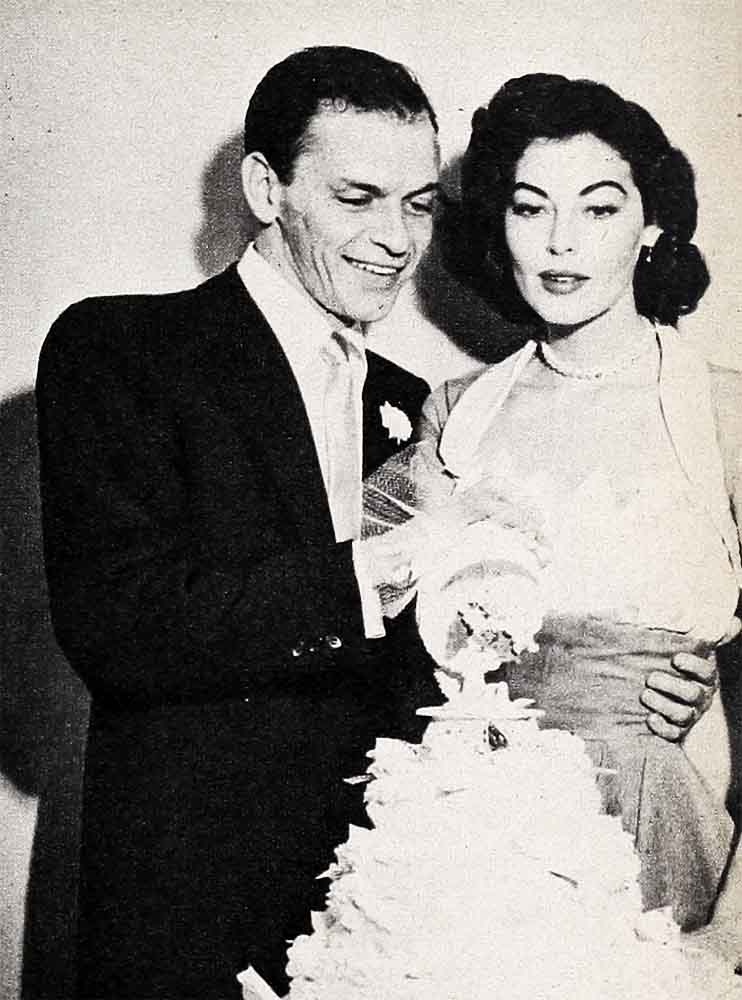
“I think I’ve about convinced her that it’s the real thing this time,” Frank told me one night at an NBC rehearsal. “She’s been a great mother and a wonderful person through it all.”
And in between the talks with Nancy, Frank was having his problems with Ava. She was restless. She didn’t want to wait forever for him to get the divorce. Ava was in London . . . and then in Spain . . . with a headline-hunting, bull-throwing bull-fighter named Mario! Frank flew to Europe. He found that the bullfighter was no real rival.
In London, where I saw them, they were happy as they roamed the great city, sightseeing. But Frank was still suffering the tortures of doubt. There were scenes. Heated quarrels. Moments when life’s many problems seemed too difficult for the moody, melancholy Frank ever to solve them . . . Moments when he just didn’t care what happened to him.
I doubt if there was ever such a wedding hassle. On a Saturday night, all was prepared for a wedding on the following Monday. They decided to have a small pre-wedding dinner at the swanky Colony restaurant Saturday night, with the James Masons as guests. Afterward they went over to Broadway and 51st Street to the Sugar Hill Night Club.
A quarrel developed. A serious quarrel. I’ve heard that Ava felt that Frank was insufficiently attentive that night, and said so. I’ve heard, too, that Ava may have given way to some unjustified jealousy.
The flareup led to Ava’s canceling the wedding plans that night and throwing his ring at him. On Sunday and part of Monday, they weren’t speaking . . . Frank, who had given up his wife to marry Ava . . . Ava, who had dared public opinion and the objections of her studio to marry Frank.
It took another day or two to patch it up. Few people realized, when the wedding was finally over, how near they had been to no marriage at all.
Ava immediately began signing her autographs “Ava Sinatra” and finally Frank had what he wanted . . . or had thought he wanted . . . “happiness.” With Ava there to love him and encourage him, he had no reason not to start back up the ladder again.
Ava undertook to help him. When I visited their apartment at the Hampshire House in New York one afternoon, I heard her say to him half-chidingly, “I thought you were going to get a piano up here and do some work.”
Frank indicated that a guy wasn’t supposed to be working on his honeymoon. That seemed reasonable enough to me.
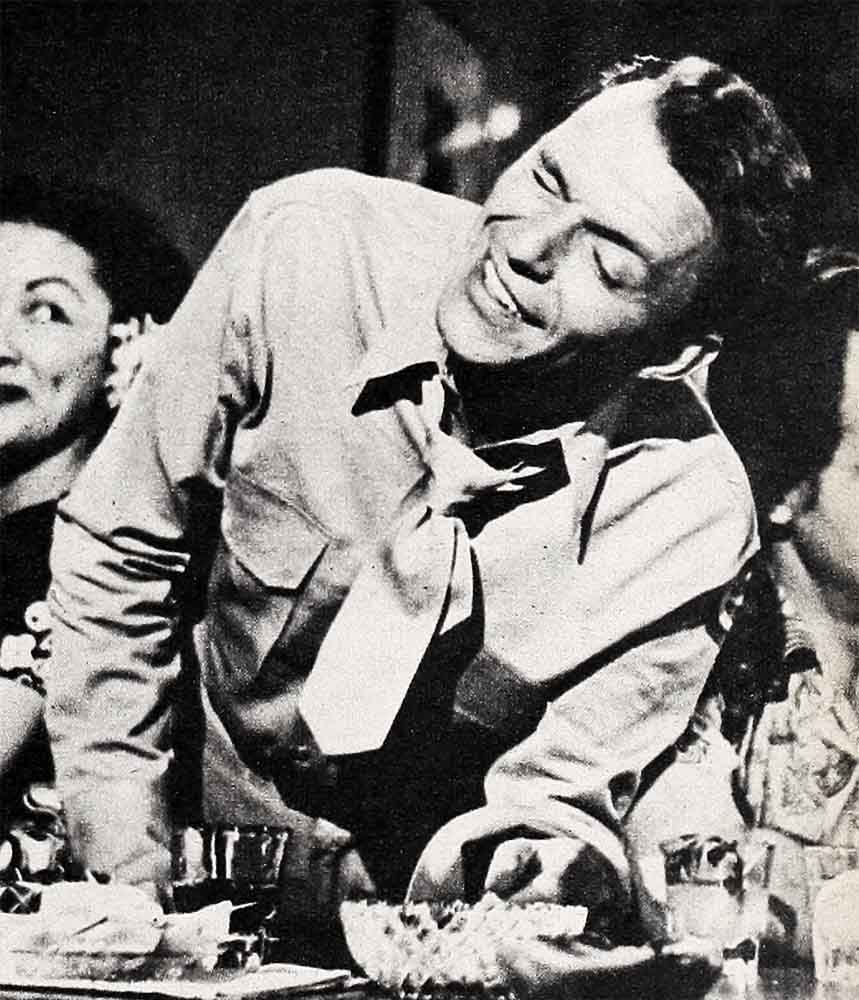
But when Frank got going, he was never better. He sang magnificently again, he was charming again, he made up with all the newspaper people he’d been at war with, and he let the photographers know that he was sorry he’d called them “creeps.” His close friends were no longer long-faced. They felt happy about his future.
And suddenly while all this was going on . . . while there was “new interest” in Frankie in Hollywood . . . the new marriage almost busted up.
It’s getting hard for me to keep their quarrels and near-bustups straight in my mind. But this one, staged one night in Palm Springs, hit the front pages again.
“Frank threw Ava and Lana Turner out of the house in Palm Springs,” an informant tipped me.
It didn’t seem believable. And it was the kind of a story that I didn’t want to write because I had always considered myself a friend of both. I made a couple of calls to Hollywood and Palm Springs to find whether the story was around out there. Because if it wasn’t, I wasn’t going to write it. But if it was, I’d have to pitch in, do the usual reporting, and tell the story in full.
One call revealed what I had feared—the story was known and was already being told in a couple of the Los Angeles columns. Reluctantly, I had to write one more story revealing my friend’s tendency to invite disaster.
Probably we’ll never know exactly what the girls were saying that so aroused Frankie’s wrath.
But, whatever it was, Frank seemed once again to be destroying himself—just when everything was going beautifully. Ironically, when lawyers were trying to push through the new Ava-M-G-M contract providing that Frank co-star with Ava in a picture, they were also trying to prevent Ava and Frank from breaking up!
Even the lawyers couldn’t keep up with their battles. And then they made up again. As Father Divine said, “Peace, it’s wonderful!”—but it was short-lived.
Now we come back to that classic Russian motif.
It’s this that makes me feel this couple doesn’t want contentment very much. Frankie was being acclaimed from coast to coast last fall for his great acting in “From Here to Eternity.” He was flying home from Europe to be welcomed with much hoopla.
“Frankie’s riding higher than ever before,” folks said.
Ava—still in Europe—was to follow him home. She came in on schedule, early in the morning, but Frankie wasn’t there to meet her at the airport. She went to the Hampshire House, he stayed at the Waldorf. For days they didn’t speak. Various friends tried to get them together. They did get them together on the phone . . . when only a worse battle developed.
“The Voice” was singing at the Riviera in New Jersey then, to great crowds. At his opening, every celebrity in New York had shown up, except the one he wanted to see—Ava.
Frank’s mother went to see Ava and tried to mend it. Ava bitterly stuck to her point that Frank should have met her at the airport.
Frank’s pals argued that Frank hadn’t known from Ava that she was arriving—that she’d neglected to tell him because they’d had a battle over the transatlantic phone.
Pride was involved, too, by now. Each thought the other should take the first step toward making up.
One of Frank’s chums got an idea.. not at all original. He would call Ava and tell her that Frank wanted to speak to her. Knowing, though, that he couldn’t get Frank to take the first step, he would tell Frank that Ava was on the phone, and wanted to speak to him.
It was a good idea—but there was one flaw. Each thought the other was making the apology—so each was aloof, haughty and disdainful.
“Say, who started this apologizing, anyway?” one asked.
“You did!” retorted the other.
“I did!”
“Certainly, you called me, didn’t you?”
“You mean, you called me! I wouldn’t call you if it was the last thing I ever did!”
“But they told me that you wanted to apologize to me . . .”
And the plot failed, with each howling vociferously and angrily at the other, as each slammed down the receiver.
After a couple more weeks of this, Ava slipped out to Frank’s mother’s house in New Jersey one night. Frank, still singing at the Riviera, rushed over after his first show. They made up right there, and Ava went back to the Riviera to hear him sing.
With Ava in the audience, Frank changed one of the gestures in his act that had been getting a good laugh during their battling. Singing “I Get a Kick Out of You,” Frankie had illustrated it by an actual kick—as though he were getting booted in the derriere by love, represented by Ava. But Frankie dropped that. No use starting it all over again . . .
Now rumors began circulating that Frank was switching his technique with Ava in an effort to save the marriage.
A man claiming to be an expert on such matters told Frank that Ava needed to be bossed. Frank, never that type, at least with Ava, was urged to try it.
Frankie as a cave man! He himself must have grinned at the suggestion.
A story was told which I found hard to believe. Supposedly on the night they made up, he told Ava he’d join her back at the hotel after his show.
Instead, so this tale goes, Frank didn’t get in until 5:00 a.m. when Ava made a sleepy complaint.
Frankie supposedly countered with, “Listen, I had to sit around with the boys a while. That’s the way my life’s got to be now, and don’t try to cut the corners on me too close, baby.”
No, I can’t buy that story, but it’s around. The newest truce took them to Hollywood together where they lived in absolute harmony for maybe three weeks when . . . BOOM!
Frankie flew into New York alone, hid out for a while in Jimmy Van Heusen’s apartment, got sick, lost weight, went without sleep . . . and finally wound up in a Manhattan hospital. Again the old melancholy was on him and he didn’t care.
During this period—which was a very trying one for all of Frank’s friends—because he seemed to lack “the old fight”—Ava was still in California, not doing anything about Frankie’s absence.
At last she did make a call . . . and Frank went back to California. I saw him there, a thinner Frankie, but seemingly composed. He had a couple of meetings with Ava, but they weren’t back together.
One Sunday afternoon I went around to his suite at the Beverly Hills Hotel. He was there alone. The radio was on, playing some musical program, and Frank didn’t hear my knock at first.
“Come on in,” he said, then, and I sat with him and mentioned that I was sorry I had to keep writing about this . . . but that the public seemed to demand it. Frank nodded, silently. He seemed to understand.
This was when Ava was announcing that she was getting a divorce. It had been suggested by their friends that despite her announcement, Frank would fly to Italy or Spain to see her over Christmas. But when I mentioned this to him—in late November—he said that would be impossible. “I’ll be working, I won’t be able to get away,” he said.
But of course he got away . . . he found the time and went. That’s a sign to me that Frank’s still going to keep on trying for a long, long time.
What’s to happen now? They can get a divorce even . . . but I’ll still say that won’t be the end of it. If they ever do divorce, they’ll make up all over . . . and try it again. Not that they’ll ever live happily together.
Some friends of the two have considered that psychoanalysis is to be the answer. It is rather amazing, for example, that Ava, long ago adjudged one of the greatest sex-appeal women in Hollywood, should ever feel that Frank cared more for somebody else. Yet she has had these streaks. Which probably only proves that she’s like any other female concerning her man.
Frank, when advised that Ava’s too complex for him, and that he should give her up, has said: “Sure, it’s very easy for somebody to say give her up . . . when they’re not in love with her.”
And through all the unhappiness, shines Frank’s talent.
In his hotel room he may seem the unhappiest individual in the world, but on television the same night he may give you the feeling he’s the happiest guy living.
It happens that I’ve just now seen him scintillate on TV and have mentioned to a friend how good he was.
“True, but so what?” asked my friend.
“I’ve never seen him give a bad show.”
THE END
It is a quote. PHOTOPLAY MAGAZINE APRIL 1954




